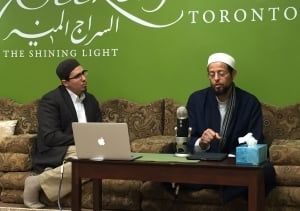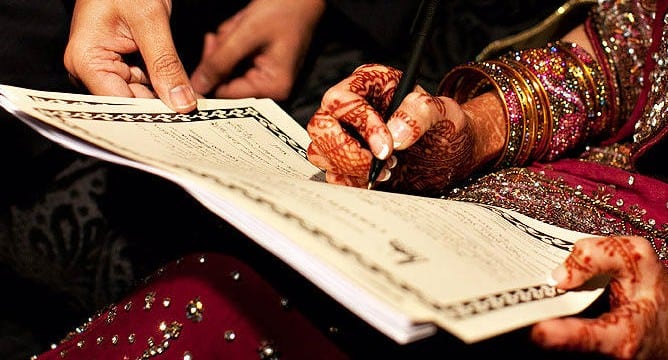The Muslim Marriage Crisis – A Frank Conversation with Imam Zaid Shakir
Fahad Faruqui had an in depth discussion with a leading American-Muslim scholar Imam Zaid Shakir, a senior faculty member of Zaytuna College, about marriage, polygamy, temporary marriages and divorce, in attempt to tease out the true spirit of love, romance and marriage in Islam.
A brief SeekersHub course on being married won’t cost you a penny but could do absolute wonders for your lovelife. Take a look here.
Some Muslim men and women spend several years in finding the right spouse. Very few know what exactly they’re looking for beyond physical beauty and financial stability, which has proved to be insufficient for a sustained, successful marriage. And many others have a skewed Disney fairytale version of love and marriage in mind.
Marriage in Islam, in the outward sense, is merely a social contract, but the wise Imam explained that it is also a “spiritual covenant,” which got me thinking.
Fahad Faruqui: Can you talk a bit about how the institution of marriage is seen in Islam? And what should one look for when searching for a spouse?
Imam Zaid Shakir: Marriage in Islam is a sacred covenant, whereby intimacy between the genders becomes lawful and sanctified, and acceptable to the Lord of the Worlds. So there is definitely a deeper spiritual covenant to it, and I think a lot of times we lose sight of the fact that there’s an issue of not only fidelity towards one’s spouse and not only a desire to please one’s spouse and to sacrifice for one’s spouse, but also to please Allah and to have fidelity in our dealings with Almighty God.
Marriage is an institution whereby we can deepen our relationship not only with another human being, but with Allah subhanahu wa-ta’ala.
 Q: It seems that more and more people are losing faith in the institution of marriage. What is the root of this problem?
Q: It seems that more and more people are losing faith in the institution of marriage. What is the root of this problem?
A: It’s a societal problem, so our societies are increasingly of people who’re divorced from not just the teachings of Islam per se, but from deeper ethical and moral teachings. And these kinds of issues you’re pointing to are only manifestations of those deeper crises.
Q: When you say marriage is a spiritual covenant, where does Islam place those men and women who cheat on their partners and hence, put their relationship in jepoardy?
A: I think it affirms the fact that they’re living a life divorced from a sense of responsibility…A wife is a trust from Allah. A husband, a family is a trust. Allah ta’ala mentions in the Quran: “O ye believers! Don’t betray Allah and His messenger.” And simultaneously by so doing, you’re betraying the trust.
Q: Why Islam gave men the right to marry four women at a time?
A: There are situations where there are disproportionate number of eligible women, and polygamy allows a dignified way for those women to be married.
Q: Even though the reasons for allowing polygamy may be well founded, why do we see the practice being misused?
A: Oh, most definitely! Any social institution can be misused. Marriage itself is misused, like for obtaining residency, visas, extending favors to relatives, and situations that render those people involved extremely unhappy in many instances. So there’s no doubt that polygamy is misused. And this is why Islam tried to regulate the practice, so that the potential for misuse can be minimized.
Q: How did Islam curb the pre-Islamic forms of marriages?
A: First of all, by limiting the numbers of wives. When you had marriages [in pre-Islamic era] where there were 10 or 12 wives for one man then you basically had a revolving-door policy, where three or four wives were divorced every few months and then others taken on. This sort of nonsense was something that Islam tried to eliminate by making manageable arrangement that was subject to limitation. Also requiring the equal treatment of one’s wives–in terms of their maintenance, clothing and provisions.
Islam tried to regulate a practice that has social benefit in many situations and instances, and to elevate thereby the status of the man and the woman. Anyone who’s suggesting that primary motivation for man marrying another wife is boredom is extremely misguided.
Q: There have, however, been instances of exactly that–men marrying out of boredom.
A: Definitely, there are instances. Okay, my wife doesn’t turn me on anymore, so I’ll go get another wife, you have instances of that. But how frequent is that? Especially in light of the fact that in non-oil producing Muslim countries and increasingly even in those countries, such as Libya and even Saudi Arabia, where the population is growing, an average guy can’t afford one wife. It has become increasingly difficult for 99 percent of Muslim men to get married – period – to a single a wife.
So to take the practices of a small minority and extrapolate from that into a situation that supposedly represents the norm–the normal Muslim man being bored with his wife, so he gets another wife–I think that’s a dangerous way of looking at social reality.
How many Saudi men can involve themselves in this sort of nonsense?
Q: A good number, Imam Zaid.
A: What percentage would you say?
Q: In terms of percentage in the Muslim ummah [community] it may be low. There is a problem when the west or even the feminists look at the Muslim world and say that such practices are becoming normative.
A: I am not denying it’s a problem. And I am not denying it is a misuse of religion, and it’s the abuse of an institution that was instituted for noble means, so that’s definitely true.
Q: Aren’t temporary marriages–like misyar, misfar or mu’tah–escaping the commitment and responsibility towards the family?
A: That’s why we believe temporary marriages were forbidden! And these sorts of arrangements are extremely questionable. And I said, these are only excuses that point to a deeper set of problems in the society. When one is looking for legal loopholes to escape one’s responsibility, then it’s a betrayal. When one is looking for legal loopholes to escape one’s responsibility, get out of a contract that one has entered into through guiles and schemes–this is a betrayal of Allah and the betrayal of the messenger of Allah, who introduced a set of very serious practices to this ummah in order to safeguard the social and spiritual integrity of the ummah. These practices you point to are simply indications of social disintegration.
Q: But what’s surprising is that practices like misyar [arrangement marriage] is preferred by women, who are not willing to completely invest themselves in marriage and would like to keep their options open while getting expensive gifts.
A: That’s exactly what I am pointing to. It’s a deeper problem that transcends gender and points to spiritual crises, where the religion is just a set of rules to either be adhered to, if you’re pious, or to be skirted around by various guiles and schemes, if you’re not pious. And women who would facilitate such foolishness are just demonstrating that they too are affected by that spiritual disease.
Q: What should be guidelines for marriage then?
A: I think the guidelines should be, first and foremost, a study of marriage relationships. They should think: Will this person help me in my deen [Islamic code of life]? Will this person be an aid for me in attaining paradise? Will this person be a good mother or father for my children? Will this be someone who will be faithfully committed to me in my old age, when I need someone to assist me and to strengthen me? These are the questions people should be asking, going into a relationship.
Q: What would you advice to those looking for spouses?
A: I would advice, first and foremost, to not be fanatically committed to superficial things such as looks or income or profession that is if a person is close to standards of acceptability then to move in to look at their character and look at their religion…Character is what’s going to sustain the relationship, not good looks. Good looks fade. Big muscles become puffy and soft. Slim waistlines tend to bulge and expand as the years go by.
Q: What would you suggest to those who are married but feel they’re falling out of love?
A: It’s very important for them to do some of the things they were doing when they fell in love. Like when you ask people what did you do when you fell in love, they’ll say, we took walks together, ate out, went to the park ever Saturday and just sat and watched the children play. And invariably you’ll find that they gradually stopped doing those things. So the things that led to them being in love in the first place were stopped. How does one expect to sustain a deep emotional attachment when the things that led you to develop that attachment in the first place, have faded away.
Resources on Muslim Marriage for seekers
- Marriage in Islam: A Reader
- Unregistered Marriages: A Muslim Concern
- The Fiqh of the Marriage Feast (Walima)
- Advice on Breaking an Unwanted Marriage Engagement
- Can a Husband Marry a Second Wife Without His First Wife’s permission?
- Staying Connected to Your Purpose Even When Your Marriage is Rocky
- The Ruling of First Cousin Marriages: A Balanced Perspective
- The Intentions of Marriage – Shaykh Ali bin Abu Bakr al-Sakran
- How Important Is Physical Attraction in Marriage?
- When Love is Not Enough: Reassessing Marriage
- Video: Finding a spouse, maintaining strong marriages
- Single Muslims – Why Can’t We Get Married?
- Can I Marry a Non-Practising Muslim Man?
- Does a Marriage without Repentance Count?
- Is it Prohibited to Marry Someone Guilty of Adultery/Fornicatio?
- What to Do When My Parents Reject My Choice of Spouse?
- Is Polygamy really Allowed?
- Why Is Polyandry Not Permissible?


